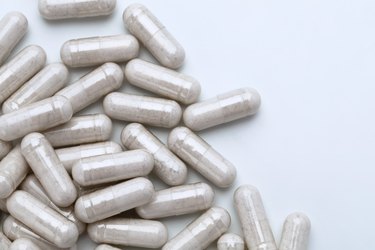
Traveling through the digestive system can be challenging for bacteria, but the only way to get the benefits from probiotics is to make sure they're alive until they get to your intestines, where they grow and colonize. Unfortunately, probiotics and stomach acid don't always mesh well.
While some probiotics aren't killed by the harsh conditions of your stomach acid, you may need to take other forms of probiotics with an enteric coating, which acts as a shield and protects the probiotics from the powerful acid in the stomach.
Video of the Day
Video of the Day
Tip
Some of the most common probiotic strains, including Lactobacillus, Bifidobacterium, and Streptococcus are resistant to stomach acid and can survive the stomach's harsh environment. But other strains need an enteric-coated capsule, which protects them from stomach acid, to make it into the small intestine where they perform their health benefits.
What are Probiotics?
Probiotics are microorganisms — typically bacteria — that help keep your gut, your digestive system and your entire body healthy. Sometimes called "good" or "friendly" bacteria, probiotics are available in supplement form and are also in some fermented foods like yogurt and sauerkraut.
Because they're often connected to gut health, you may think that probiotics mainly contribute to a healthy digestive system, and while that's certainly part of their health benefits, they also do a lot more. According to a June 2014 report in Acta Pharmaceutica, probiotics also help:
- Prevent the growth of harmful bacteria
- Boost immune function
- Prevent allergic diseases
- Lower blood cholesterol
- Reduce the risk of developing cancer
- Reduce the risk of getting an infection
- Help alleviate lactose intolerance
But while probiotics have the ability to do all of these things for your health, whether or not they can perform these functions depends largely on if they can successfully bypass your stomach acid, which is very powerful, and make it to your small intestine where they can colonize and grow, according to a February 2014 report in AAPS PharmSciTech.
The good news is that some of the most common probiotic species, including Lactobacillus, Bifidobacterium and Streptococcus_,_ are acid-proof probiotics that are strong enough to withstand the harsh environment of your stomach.
Read more: Signs of Too Much Acid in the Stomach
Probiotics with Enteric Coating
But there are some other strains of probiotics that get killed by stomach acid. These probiotics also have a better chance of surviving until they get to your intestines if the supplement has what's called an enteric coating. According to the Canadian Society of Intestinal Research, an enteric coating places a barrier over the probiotics that prevents the capsule or pill from dissolving in the stomach acid.
The enteric coating has a certain pH that can withstand the harsh environment of the stomach, but then starts to break down once it gets to your intestines — which is where you want the probiotics to be.
The types of supplements that generally need an enteric coating are those that are sensitive to moisture, stop working over time or are specifically vulnerable to the gastric juices. Because probiotics, with the exception of Lactobacillus, Bifidobacterium and Streptococcus species, fall into all of these categories, you may benefit from getting an enteric-coated capsule if you're taking a specialized blend of probiotics.
Another thing you can do is look for probiotics that are available as bacterial spores. According to an older, but still relevant, spring 2006 publication of Nutrition Digest from the American Nutrition Association, bacterial spores are more resistant to the harsh environment of the digestive tract. The probiotic species Bacillus is most commonly available in spore form.
The best probiotic delivery system depends on which types of probiotics you need to take. If you're not sure which probiotics are right for you or you've never taken probiotics before, talk with your doctor or a qualified nutrition professional before starting a new supplement regimen.
- Canadian Society of Intestinal Research: "Are the Coats on Your Pills the Right Fit for Your Gut?"
- Nutrition Digest: "The Science of Probiotics"
- Acta Pharmaceutica: "Enteric Coating of Granules Containing the Probiotic Lactobacillus Acidophilus"
- AAPS PharmSciTech: "A Review of the Advancements in Probiotic Delivery: Conventional vs. Non-conventional Formulations for Intestinal Flora Supplementation"